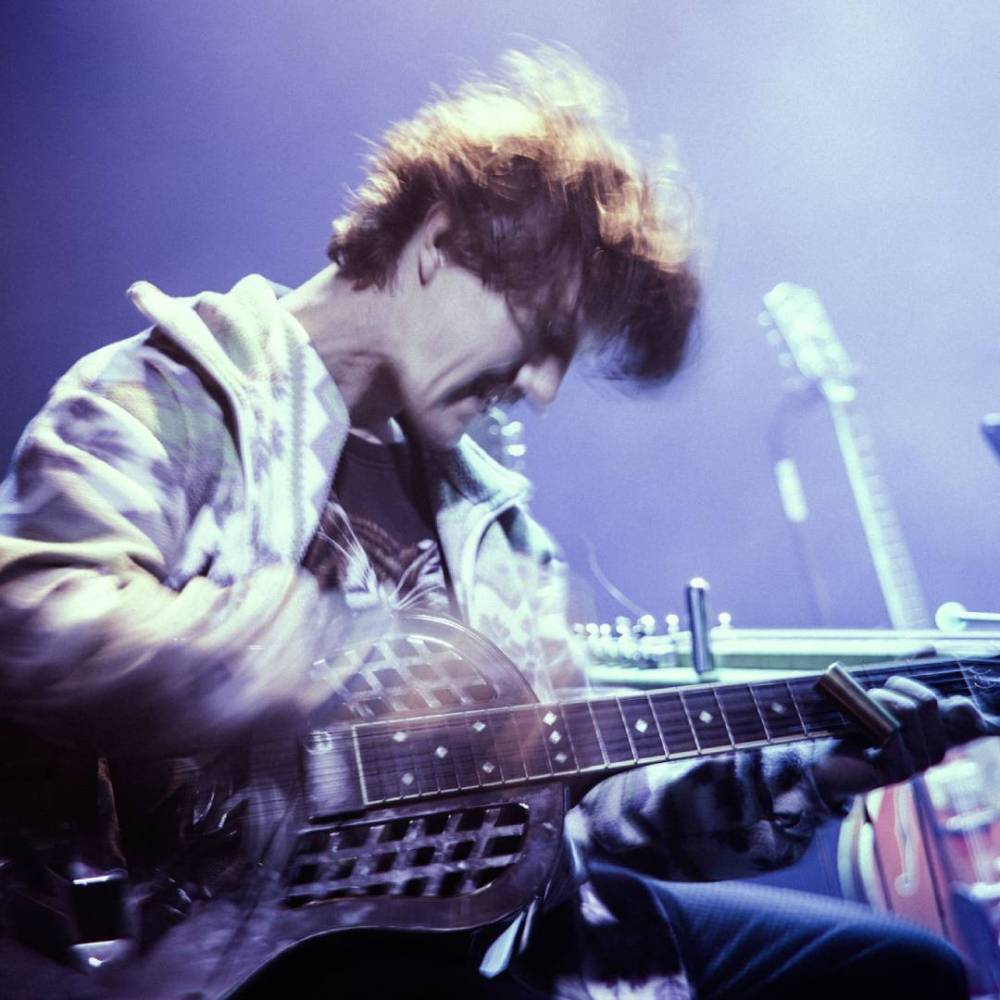Image via Ferre Magnus
Listening to Lingua Ignota gives Wolfgang Mowrey keeps a CD copy of D’Angelo’s Black Messiah in his car and it always shines.
Vitja Pauwels excels at taking something familiar and dissembling it to a malleable core. The Brussels-born guitarist can mutate his instrument from jazz fusion into cosmic country. He’s a master of summoning small-scale grandeur, artfully manipulating and expanding his acoustic guitar with live loops and delays.
It started with classical guitar as a teenager. But soon after, Pauwels went electric after falling in love with post-grunge American rock and pop. After a brief stint studying architecture, he turned his focus to jazz, studying guitars and electronics for two years each in Antwerp, later moving to Trondheim in Norway to spend his final year of school studying under Stian Westerhus – whose twists of sound manipulation, prominent in his recordings with Jaga Jazzist as well as the metal group Ulver, have made him one of his country’s most prominent jazz guitarists. In Westerhus, Pauwels found more than a mentor, but a key to unlocking an entirely new dimension of his instrument.
In 2022, Pauwels released his debut studio album, Drift By / Sink In: a suite of hazy americana and jazz sketches that felt equally inspired by William Tyler and Bill Orcutt, crossing between dusty-eyed awe and blustering defiance. He leaned on the hum of a pedal steel guitar and modulated his guitar into a cubist weapon.
As the frontman of the band Bombataz, Pauwels has frequently returned to his early fascination with ’90s rock. On their 2023 album, Baby Dry My Tears, he warbled in front of chunky synths, aggressive riffs and breakbeats. It carries all the signifiers of the era without ever feeling like a period piece, and Pauwels conveys a sincere interest, carving out a timeline where the “rock” in “Jazz-Rock” refers to Deftones, not Cream. For the 2022 edition of the BRAND! Festival in Mechelen, Belgium, Pauwels assembled a line-up of musicians including his favorite guitarist Marc Ribot and, with no time for a proper rehearsal, sculpted musical ideas that could be quickly communicated and then expanded and improvised upon.
Listening to his latest, Early Life Forms, a live album documenting that show and released this past January on the W.E.R.F. label, any presumptive stage fright has been rendered silent. The album serves as a capstone for Pauwels’ career up to now, where he has been quietly positioning himself as one of the most exciting young guitar players in jazz.
Pauwel’s band includes himself on guitar alongside Ribot and Frederik Leroux, organist Laurens Dierickx, and Bombataz drummer Casper Van De Welde. They sound fully realized here, and Pauwels’ compositions shine through with clarity and confidence. The music excels because of its deceptive looseness. Over nearly an hour, the band wanders into a third space governed by like-minded collagists Bill Frisell and Ry Cooder.
On “My Little Renaissance,” a jilted carnival rhythm takes shape from Ribot’s Eddie Hazel-like guitar wails and Dierickx’s organ vamps – juxtaposed with Pauwels’ fingerpicked resonator guitar. Album highlight “Latin Dancer” supplies a passionate pastiche of Latin rock and Soul-Jazz, pulling in a dozen different directions. From the subdued opening of “Overland” to the exuberant “Groove Encore,” the band doesn’t so much straddle genre lines as it evaporates their supposed distance. The interplay between players and styles becomes immaterial, and what remains takes on a new shape, crawling out of the ooze and evolving into what Pauwels tells me is his best experience with music in his life, ever.
(This interview has been condensed and lightly edited for clarity.)

